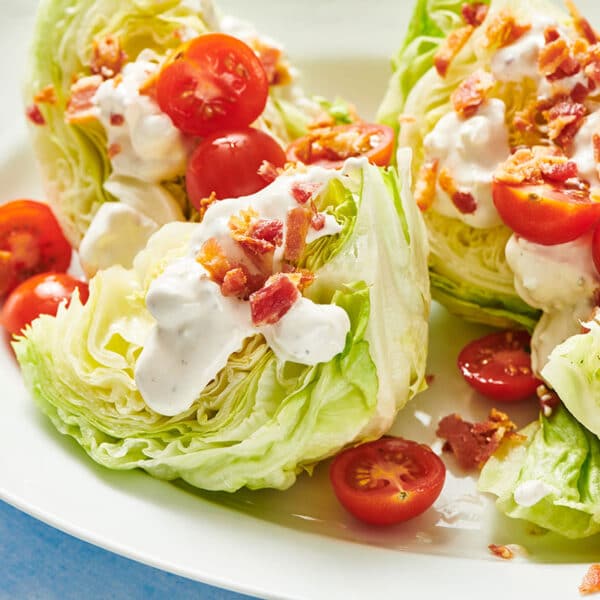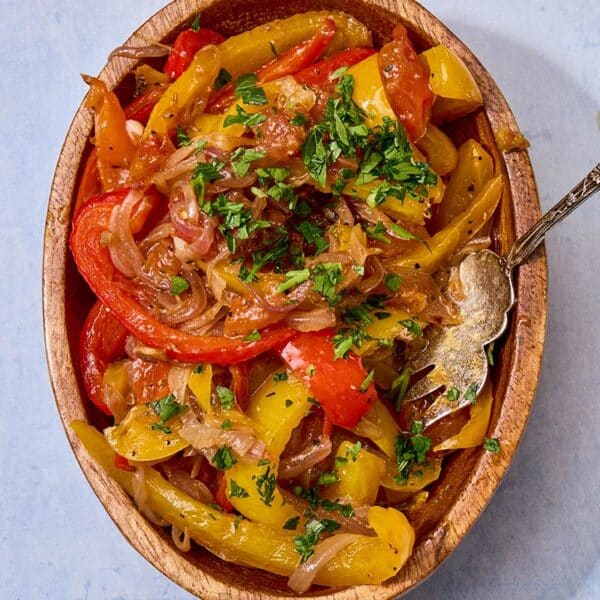Stewed Tomatoes
on May 30, 2024, Updated Jul 08, 2025
This post may contain affiliate links. Please read our disclosure policy.
Learn how to make stewed tomatoes from scratch- soft, sweet and versatile. Perfect as a side, topping, or for freezing and meal prep.
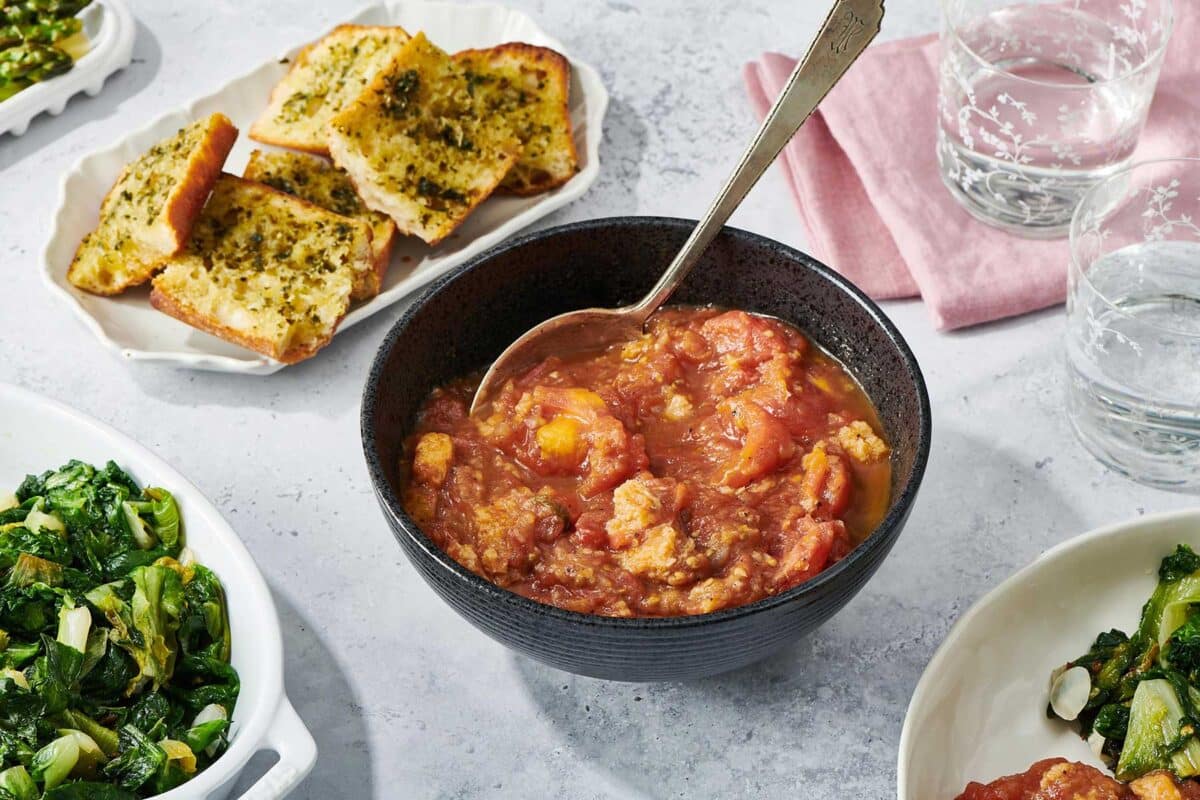
Old-fashioned stewed tomatoes are a fabulous ingredient but also an amazing dish all on their own — they don’t need to be mixed with anything to taste amazing! They are like a super chunky tomato sauce and can be served as a topping or a side dish with Baked Chicken Thighs, Baked Salmon, or Air Fryer Steak. You can also heap them on pasta or rice, or maybe a portion of Zucchini Orzo Casserole. Almost any simply cooked main dish or starch pairs well with these rich, sweet, cooked tomatoes.
This recipe includes bread to thicken the tomatoes, but you could leave it out or use gluten-free bread if that’s a dietary concern. This is the best recipe to grab when you need to make something simple to use up all of those gorgeous fresh tomatoes in your garden in late summer. These freeze beautifully, so no need for canning.
By signing up, you agree to our Privacy Policy.
What's In This Post?
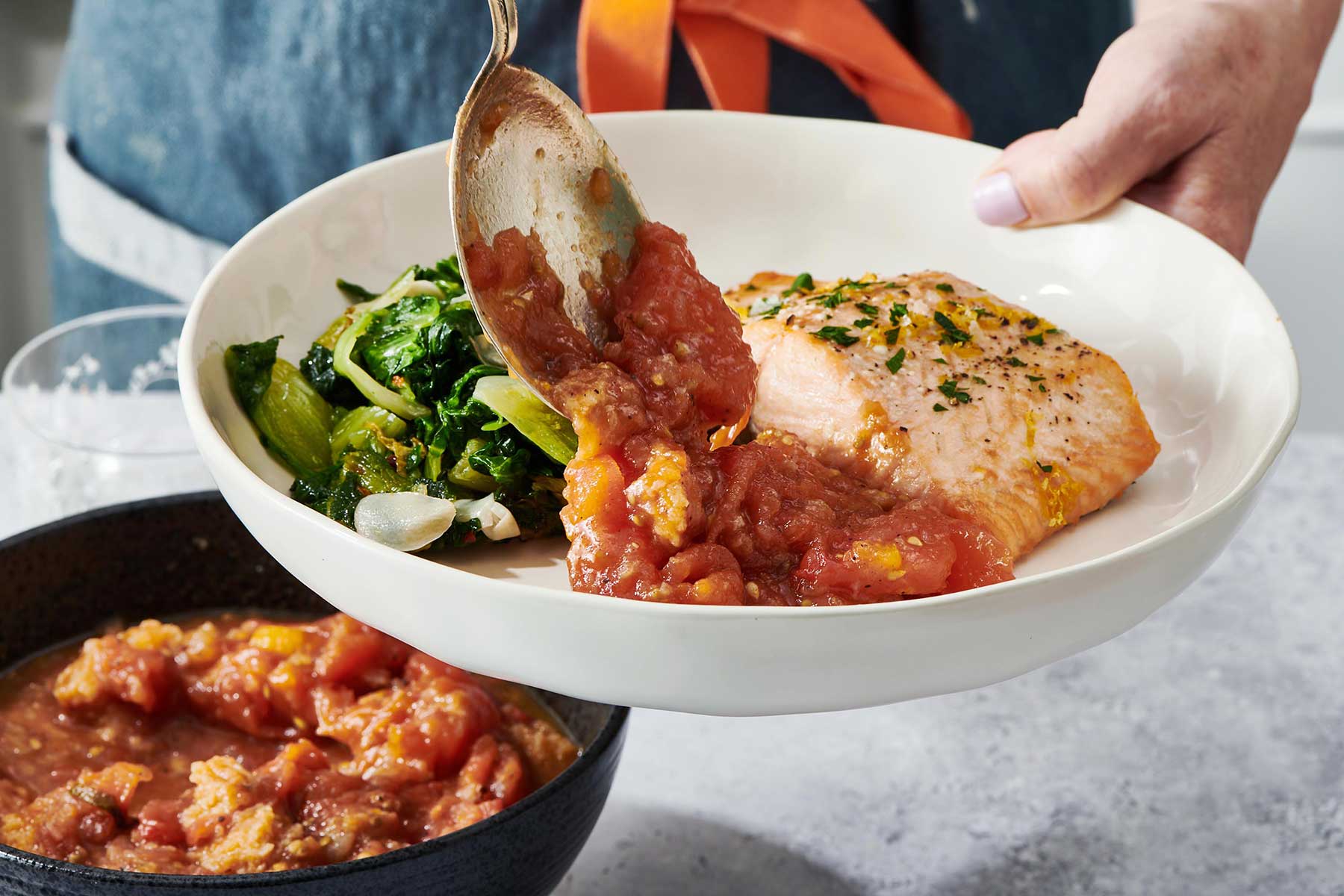
You can use stewed fresh tomatoes as an ingredient in soups, casseroles, pasta sauces, or stews. They also make a great base for shakshuka.
Stewed Fresh Tomato Recipe: Slow cooked so they become soft and sweet, these tomatoes — thickened with a bit of bread — can be used and served in so many different ways!
Ingredients
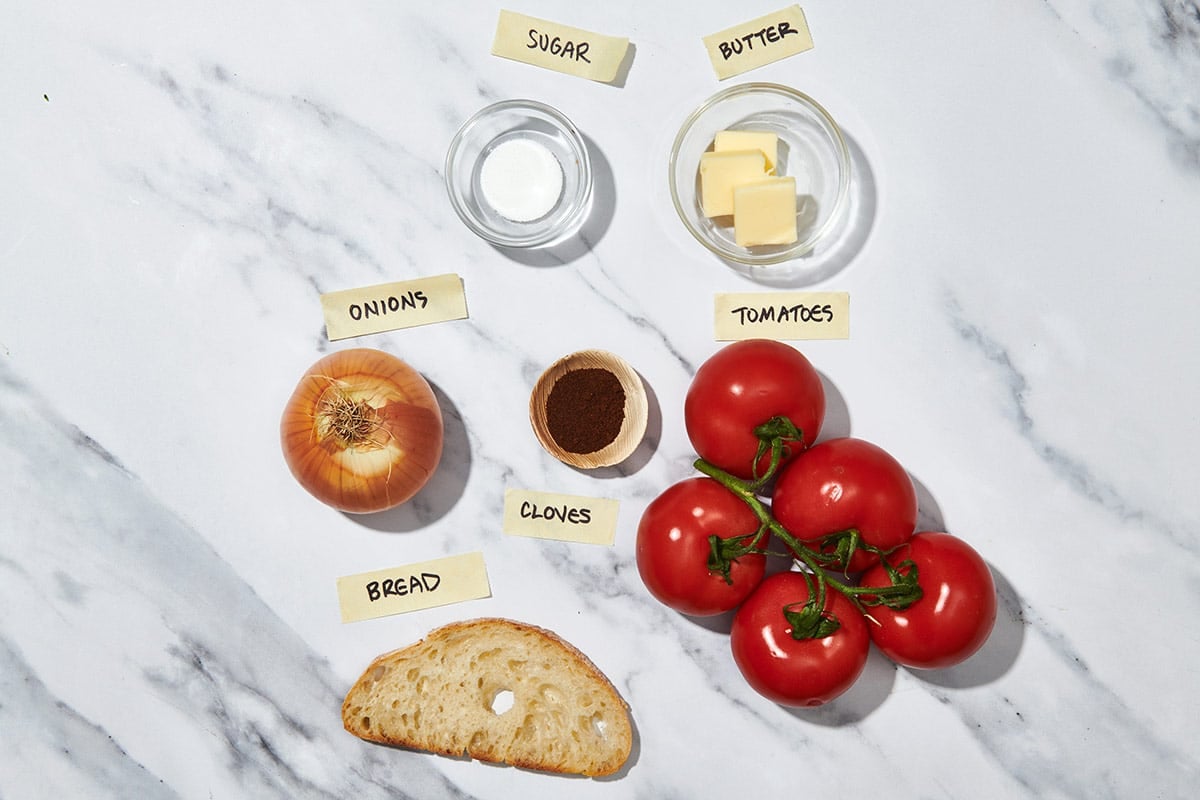
- Tomatoes – Any large, red ripe tomatoes will do; see the What to Know section below for more on picking the best tomatoes.
- Butter
- Onions – In this recipe, you want to mince the onions very finely so they blend into the cooked tomatoes.
- Sugar – The amount I suggest in the recipe is flexible. You can add more to taste.
- Cloves — You’re just using a pinch to get that distinct aromatic clove smell without overpowering the flavor of the tomatoes!
- White bread – Optional; see tip below.
Best Stewed Tomato Tips and Variations
- Use tomatoes that are ripe but not mushy.
- You can peel the tomatoes by blanching them or skip this step. All you have to do is dunk the tomatoes in a large pot of boiling water for about a minute, then remove them, put them into a large bowl of ice water, and let them cool for a couple of minutes — a process known as blanching. The skins will peel off very easily. But most people don’t mind the skin, as it breaks down and softens during the cooking time and really blends into the dish.
- A bit of torn plain white bread is added towards the end of the cooking time. This provides some thickness to the sauce, as the bread absorbs some of the excess tomato juice and binds it all together. Leftover bread, even bread that is a bit stale, is perfect. In this recipe, the bread is optional — if you prefer a looser mixture, leave it out. If you’d like it thicker, stir it in, and the bread will almost dissolve into the mixture.
- Some people like to add some chopped red or green bell peppers to the mix, along with the onions.
- Try a clove or two of minced garlic with the onions.
- If you’re looking for more flavor in your stewed tomatoes, you can add more herbs and/or spices! This recipe also tastes great with a pinch of ground nutmeg or some fresh herbs like oregano and marjoram. You can even cook the tomatoes with a lone bay leaf in the mixture to get more flavor.
How to Make Homemade Stewed Tomatoes
- Blanch the tomatoes and peel off the skins (optional).
- Cut the tomatoes into wedges.
- Sauté the chopped onions.
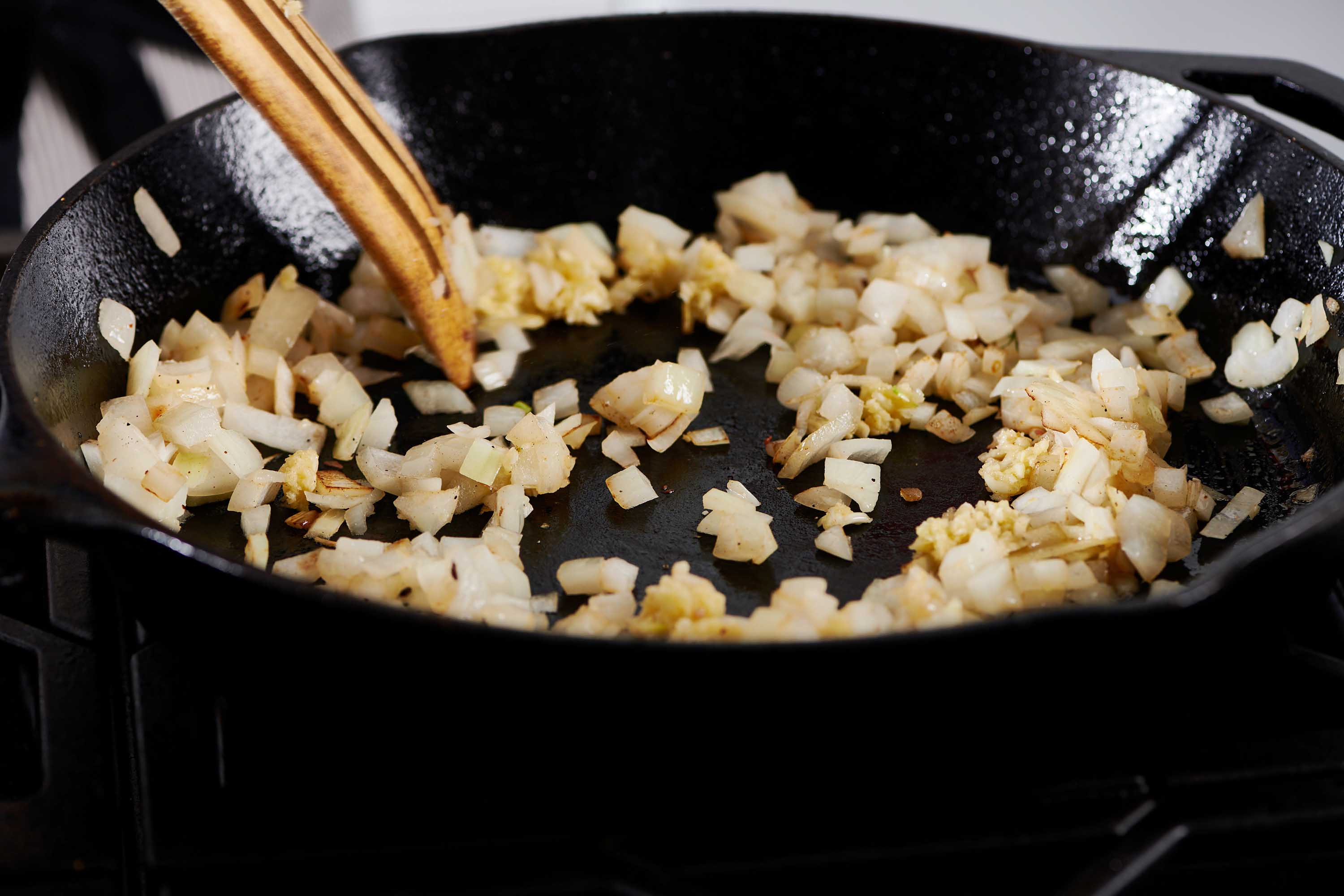
- Stew the tomatoes: Add the tomatoes, sugar, salt, pepper, and cloves. Cover and simmer, lifting the lid and stirring occasionally, for about 15 to 20 minutes, until the tomatoes have reached the desired consistency.
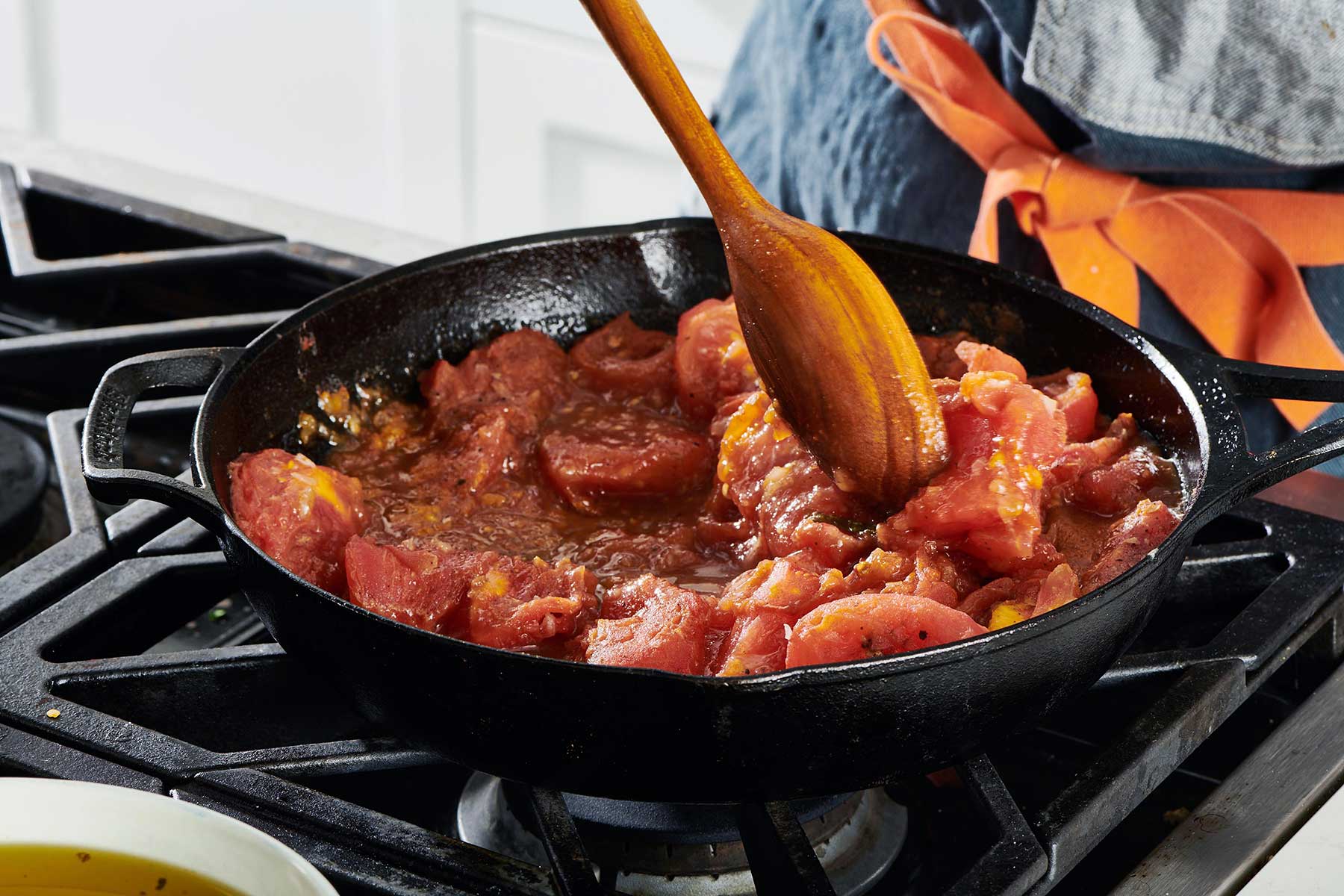
- Add the bread if using: If you want a thicker stewed tomato mixture, stir in little pieces of bread during the last five minutes of cooking.
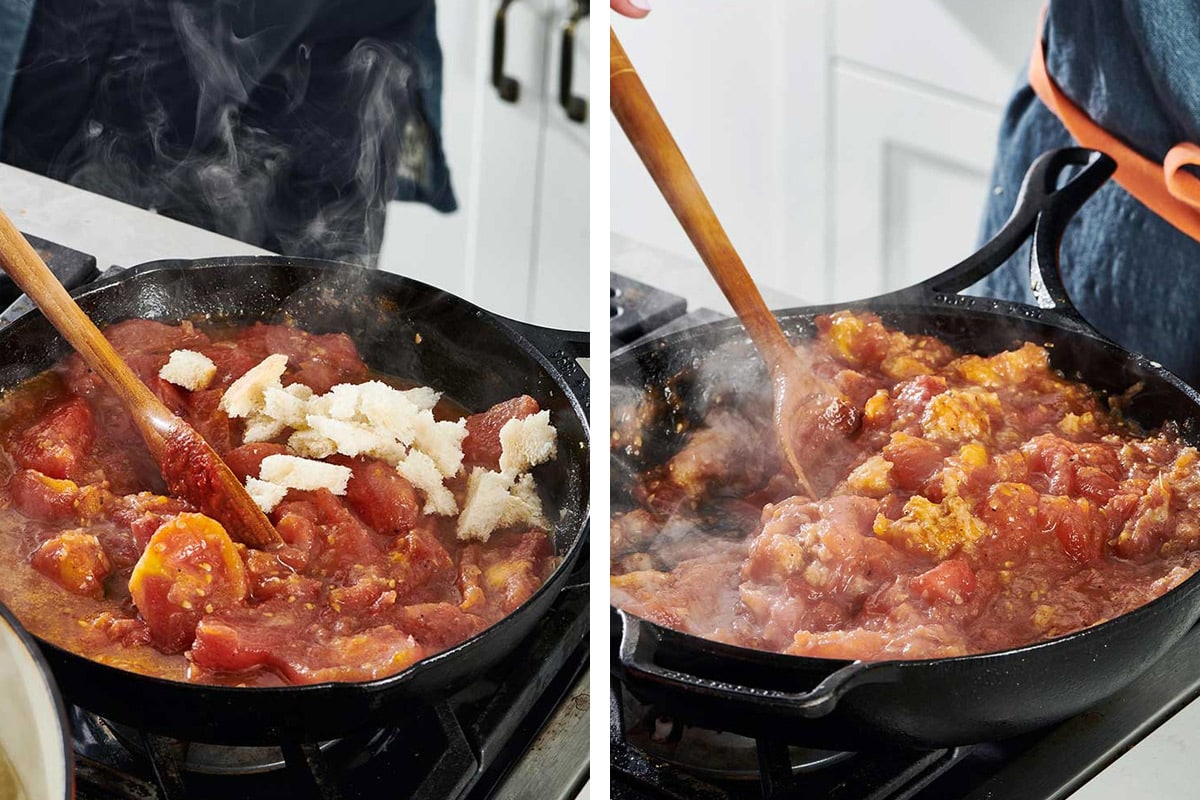
What to Know About Making Homemade Stewed Tomatoes
The definition of stewing is cooking something fairly slowly at low heat in liquid until everything is soft and tender. That is exactly what is happening with these tomatoes, except most of the liquid they are stewed in is made up of their own juices, with a bit of butter added. Unlike other “stewed” dishes, such as those made with meat, the stewing of tomatoes is a fairly speedy process, as the vegetable softens quickly in the pan.
Canned tomatoes are often canned on their own, with just the addition of a bit of sugar and some salt. Occasionally, other seasonings like basil are included, but that is usually noted on the can.
Stewed tomatoes usually have other seasonings involved, whether homemade or canned. They are usually slightly sweeter than canned tomatoes and may have other herbs, spices, and vegetables added. Also, don’t overcook them so they become sauce or mush; cook them just enough to caramelize a bit and soften the tomatoes. They should still have some texture to them. Stewed tomatoes are fresh tomatoes simmered with seasonings like onion, butter, and sugar until soft and flavorful. They’re chunkier than tomato sauce and more seasoned than canned tomatoes.
Peeling is optional, but it provides a smoother texture. Blanch tomatoes in boiling water, then cool in ice water to slip off the skins easily.
Use any large ripe tomatoes – beefsteak, Roma, or plum. Just make sure they’re flavorful and not mushy.
Bread thickens the mixture by soaking up the extra juice. It’s optional – leave it out for a looser texture, or use gluten-free bread if needed
Add herbs like oregano or marjoram, a pinch of cloves, or sautéed garlic and bell pepper. Taste and adjust seasonings as you cook.
Yes! Chop as needed and use in any recipe calling for canned stewed tomatoes for fresher flavor. You can also substitute these for other types of canned tomatoes in your favorite recipes (if a recipe calls for canned diced tomatoes, just give these a rough chop).
Simmer uncovered to reduce the liquid, or stir in a little bread near the end of cooking.
Warm gently on the stove or in the microwave, stirring occasionally.
Serve over chicken, pasta, fish, rice, or use a base for soups and casseroles.
To get deeply red stewed tomatoes, you need to have perfectly ripe red tomatoes; the color of the cooked tomatoes will be a slightly duller version of the color of the tomatoes you are using.
Yes, and it’s a great and easier alternative to canning! Place the cooked tomatoes in a freezer-proof zipper-top bag or an airtight container. Fill the bag or container almost full, leaving a little room for expansion as they freeze. Freeze for up to 6 months, then defrost in the fridge. Reheat or use in recipes as desired.
What to Serve With Stewed Tomatoes
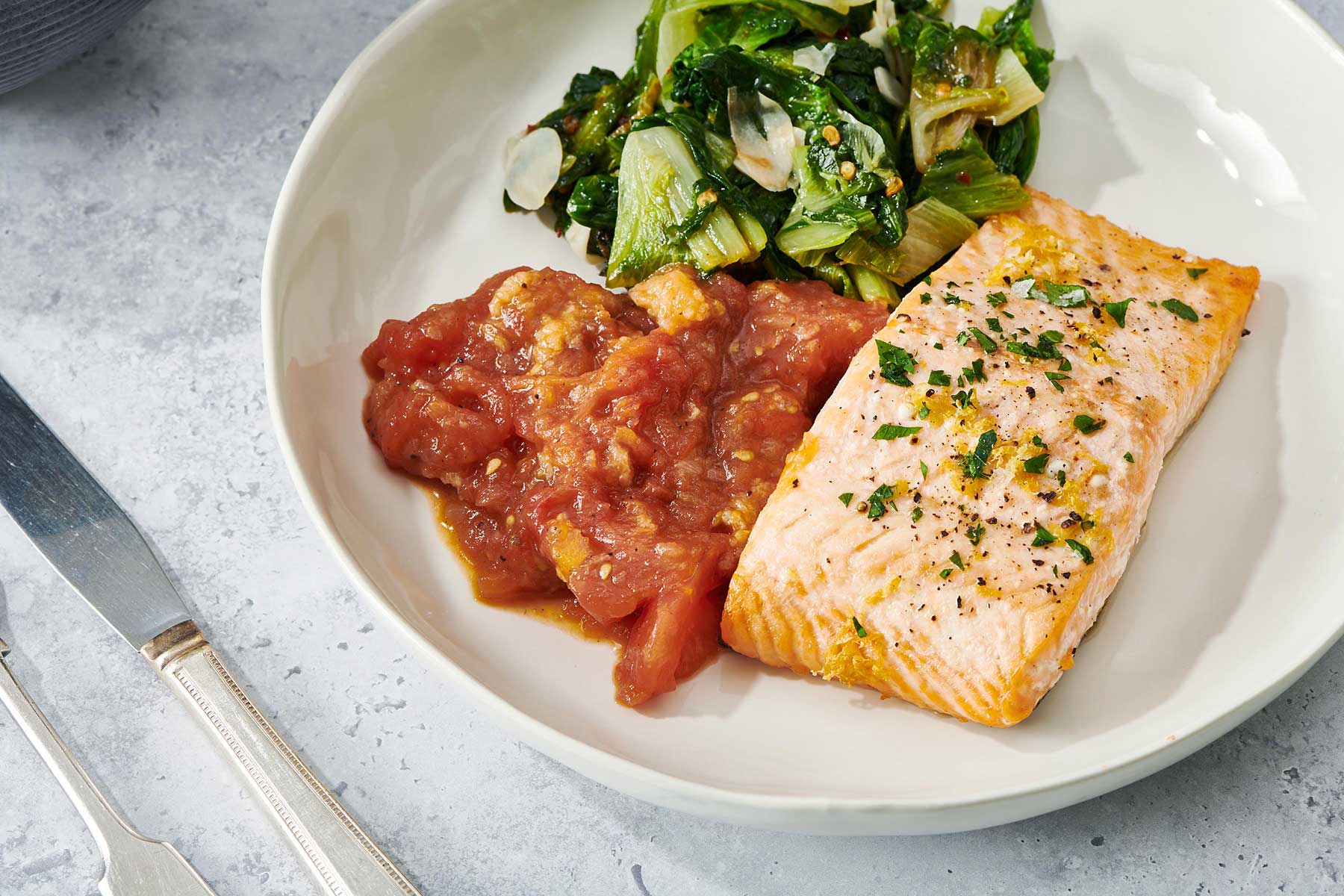
Pin this now to find it later
Pin It
Stewed Fresh Tomatoes
Ingredients
- 6 large tomatoes
- 2 tablespoons unsalted butter
- 2 tablespoons minced onions
- 1 teaspoon sugar
- Kosher salt and freshy ground pepper (to taste)
- Pinch ground cloves
- 1 slice white bread (crusts removed and torn into small pieces; optional)
Instructions
- Bring a pot of salted water to a boil. When the water is boiling, carefully add the tomatoes 3 at a time. Let cook in the hot water for 60 seconds, then remove the tomatoes with a slotted spoon. Add the remaining three tomatoes to the pot, and when the blanched tomatoes are cool enough to touch, peel off the skin. Repeat with the second batch of tomatoes.
- Cut the tomatoes into eight wedges each. Melt the butter in a large deep skillet over medium heat. Then add the onion and sauté for 4 minutes, until slightly tender and golden. Add the tomatoes and the sugar, season with salt and pepper, and add the cloves. Cover and simmer, lifting the lid and stirring occasionally, for about 15 to 20 minutes, until the tomatoes have reached the desired consistency. If you want a thicker stewed tomato mixture, stir in the little pieces of bread during the last five minutes of cooking, which will thicken the sauce.





